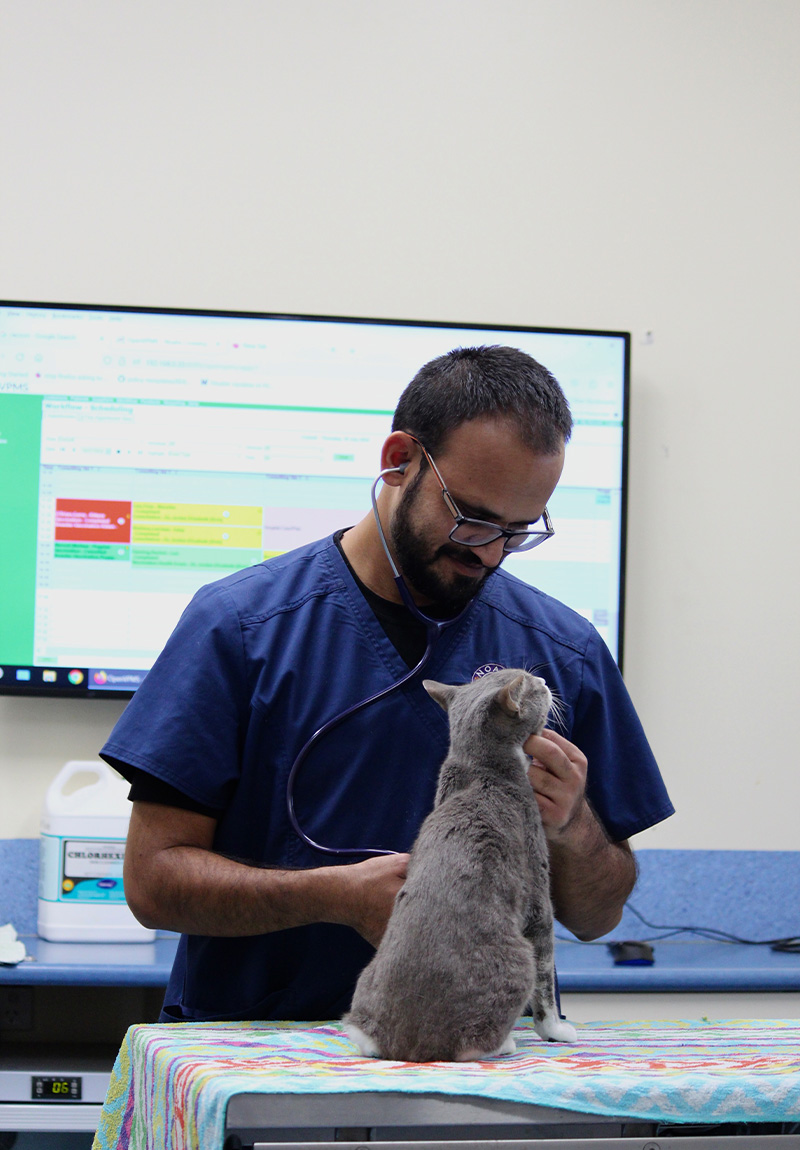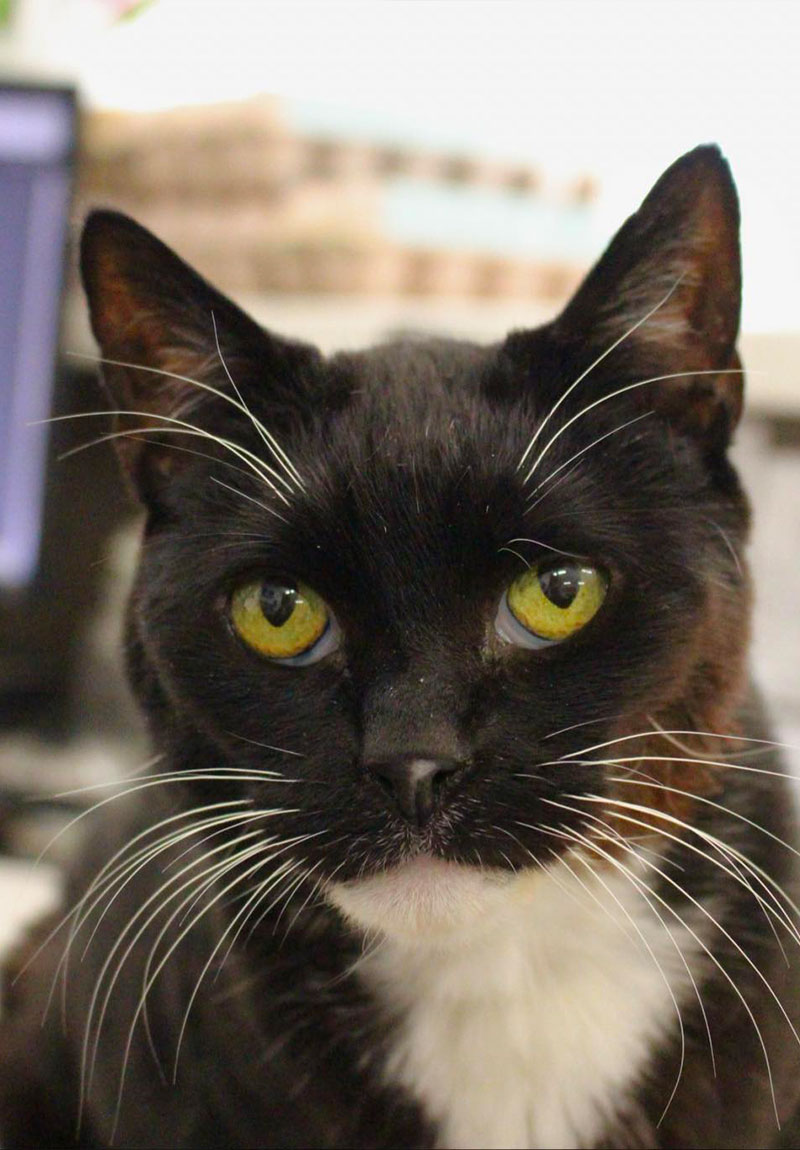Cat Vaccination
Cat Vaccination
Vaccination is crucial in preventing the spread of infectious diseases in pets, and it plays a key role in protecting both individual animals and the broader pet population. For kittens, the initial vaccination course, typically starting at 8 weeks of age, provides protection against serious diseases like feline distemper and respiratory infections. However, this protection is temporary, and kittens require booster shots as they grow. Adult cats also need regular boosters to maintain immunity. Regular vaccinations not only safeguard your cat’s health but also help prevent the spread of diseases in the community, especially in environments like shelters or boarding facilities. Responsible pet care requires keeping vaccinations up to date throughout your cat’s life to ensure ongoing protection against preventable, often life-threatening diseases.
Kitten Vaccination
Vaccinating your kitten is an essential step in ensuring a healthy start to life. Like puppies, kittens are born with maternal antibodies received through their mother’s milk, which provide temporary protection against many infectious diseases. These antibodies help shield kittens during the first few weeks of life, but over time, they begin to decline. As these maternal antibodies fade, your kitten becomes more susceptible to diseases, which is why a proper vaccination schedule is crucial.
However, there’s a unique challenge in vaccinating kittens during this transitional period. Maternal antibodies can interfere with the effectiveness of vaccines if they are still present at the time of vaccination. This is why kittens require a series of vaccinations to ensure they develop their own long-lasting immunity.
- First Vaccinations – Starting at 8 Weeks:
The first round of vaccinations for kittens typically occurs at 8 weeks of age. At this stage, the maternal antibodies have begun to decline, but they are not completely gone. The first vaccination is designed to start the process of building your kitten’s immune system. - Subsequent Vaccinations:
Following the initial vaccination at 8 weeks, your kitten will require booster shots to strengthen and prolong their immunity. These vaccines are typically administered at 12 weeks and again at 16 weeks of age. Each successive dose reinforces the immune system’s response, ensuring a strong and lasting immune defence.
Why Multiple Vaccinations Are Needed
Each dose in the vaccination series serves to boost and extend your kitten’s immunity, providing the most effective protection against disease. The timing of the vaccine schedule is critical, as the presence of maternal antibodies in the kitten’s system can interfere with the vaccines if administered too early. The final vaccine in the series, typically given at 16 weeks, ensures that your kitten’s immune system is fully primed and ready to fight off infections independently.
Post-Vaccination Care
After each vaccination, it’s normal for your kitten to experience mild, temporary side effects, such as slight lethargy or tenderness at the injection site. These reactions usually resolve within a day or two, and most kittens recover quickly. However, if you notice any severe reactions or prolonged symptoms, don’t hesitate to contact us for advice.
Maintaining Protection
After the initial series of vaccinations, your kitten will require booster shots to maintain immunity throughout their life. These will typically be given annually or as recommended by your veterinarian based on your kitten’s health and lifestyle. Regular vaccinations will help ensure continued protection against some of the most common and serious diseases your kitten may face as they grow.
Adult Cat Vaccination
While the vaccinations your kitten receives provide essential protection during their early life, this immunity gradually weakens as they grow older. Just like in humans and dogs, the protective antibodies from kitten vaccinations naturally decline over time, leaving adult cats susceptible to a range of serious and preventable diseases.
Why Adult Cats Need Ongoing Vaccination:
As your cat matures, their immune system continues to require regular support through booster vaccinations to maintain effective protection against infectious diseases.
The Importance of Annual Health Checks and Boosters:
Annual health checks combined with booster vaccinations ensure that your cat stays protected against these dangerous diseases throughout their life. During these visits, our veterinarians will assess your cat’s overall health, update their vaccinations, and discuss any specific needs based on their age, lifestyle, and risk factors.
Ongoing Protection:
Vaccination is not only about preventing individual diseases; it’s also about protecting your cat—and your community—from the spread of contagious infections. Maintaining an up-to-date vaccination schedule helps reduce the risk of outbreaks and ensures your cat remains healthy and strong as they age.
What to Expect During Annual Health Checkups:
- Physical Exam: Our vets will perform a thorough physical exam, assessing your cat’s overall health and checking for any signs of disease or age-related issues. This includes a review of their dental health, weight, coat condition, and organ function.
- Vaccination Update: Depending on your cat’s health, lifestyle, and the current vaccination schedule, we will administer the necessary booster shots. We’ll also make recommendations for any additional vaccines that may be relevant based on your cat’s living environment or risk of exposure to specific diseases.
Post-Vaccination Care:
After your cat receives their booster shots, it’s normal for them to experience mild, temporary side effects such as mild lethargy, a slight loss of appetite, or tenderness at the injection site. These symptoms typically resolve within a day or two. However, if you notice any unusual or severe reactions, please contact us immediately.
Infectious Diseases of Cats That We Vaccinate Against
Vaccination plays a crucial role in protecting your cat from a variety of potentially life- threatening diseases. Below is an overview of the key infectious diseases that are preventable through vaccination, and the importance of keeping your cat up-to-date with their vaccines to ensure long-term health.
Feline Enteritis (Feline Panleucopenia)
Feline Panleucopenia, commonly known as feline enteritis, is a highly contagious viral disease that affects cats of all ages, but is particularly fatal in young kittens and unvaccinated adult cats. It is caused by a virus closely related to canine parvovirus and can be transmitted through direct contact with infected cats, as well as through contaminated environments, food, water, and even on human clothing.
Symptoms include severe depression, loss of appetite, uncontrollable vomiting, bloody diarrhoea, and abdominal pain. Infected kittens, especially those under 12 weeks old, are at the highest risk, with many succumbing to the disease despite intensive care. Pregnant cats infected with the virus may lose their kittens or give birth to kittens with severe
abnormalities, including brain damage.
The virus is extremely resilient in the environment and may remain infectious for long periods, requiring special disinfectants to fully eliminate it. Even cats that recover from Panleucopenia may continue to shed the virus, potentially infecting other cats in the household or community.
Feline Respiratory Disease (Cat Flu)
Feline respiratory disease, commonly referred to as cat flu, is a collective term for a range of highly contagious viral and bacterial infections, with feline herpesvirus (rhinotracheitis) and feline calicivirus being the primary causes. These viruses are responsible for approximately 90% of all cat flu cases.
Cat flu primarily affects young kittens, elderly cats, and those with compromised immune systems. Siamese and Burmese cats are particularly susceptible. Symptoms include sneezing, coughing, nasal and eye discharge, loss of appetite, and painful mouth ulcers. While the death rate from cat flu is low in healthy adult cats, it can be much higher in young kittens due to their underdeveloped immune systems.
Although most affected cats recover, the disease can persist for several weeks, and recovered cats can continue to shed the virus for months, or even years, especially during periods of stress. This makes vaccination essential for long-term prevention and control, particularly in multi-cat environments such as shelters or catteries.
Chlamydia (Chlamydophila)
Feline Chlamydia is a bacterial infection that primarily causes severe, persistent conjunctivitis (eye inflammation) in cats. The infection can affect up to 30% of cats and is highly contagious, especially in environments where many cats are in close contact. Kittens are particularly vulnerable, and the infection can be more severe if they are also infected with a viral respiratory disease like cat flu.
Chlamydia can persist in the environment and be shed for months after initial infection, making it difficult to eradicate without strict hygiene and vaccination measures. Vaccination against feline respiratory disease (including calicivirus and herpesvirus) and Chlamydia helps reduce the severity and duration of clinical disease, preventing outbreaks and alleviating symptoms in affected cats.
Feline Immunodeficiency Virus (FIV)
Feline Immunodeficiency Virus, commonly known as FIV or Feline AIDS, is a viral infection that attacks the immune system, leaving cats vulnerable to secondary infections, cancers, and other diseases. Similar to human HIV, FIV is transmitted primarily through bite wounds and is most common in outdoor or feral cats who fight with one another. Saliva is the main route of transmission.
Initially, some cats with FIV may show no symptoms, while others may exhibit early signs such as fever, lethargy, loss of appetite, swollen lymph nodes, and diarrhoea. Over time, as the disease progresses and the immune system weakens, cats may develop more severe symptoms, such as weight loss, sores around the mouth, eye lesions, poor coat condition, and chronic infections. Eventually, the cat’s immune system is compromised, making them unable to fight off common infections.
In Australia, studies indicate that 20-30% of outdoor cats may be infected with FIV.
Vaccination is especially important for cats at high risk of exposure. While the FIV vaccine provides approximately 85% protection if administered before exposure to the virus, the most effective way to prevent infection is by keeping cats indoors or in enclosures, away from potential carriers.
Feline Leukaemia Virus (FeLV)
Feline Leukaemia Virus (FeLV) is another serious viral infection that attacks the immune system, leaving cats susceptible to a range of diseases, including anaemia, leukaemia, tumours, and secondary infections. FeLV is spread through saliva, nasal secretions, urine, and faeces, and is most commonly transmitted through mutual grooming, fighting, or by sharing food and water bowls. Infected cats can shed the virus in their saliva and other bodily fluids for months or even years, putting other cats at risk.
Symptoms of FeLV infection can include loss of appetite, weight loss, pale or yellow gums, vomiting, diarrhoea, and an overall decline in health. Some cats may remain healthy for years after initial infection, while others may experience severe illness or develop cancers. FeLV is particularly dangerous because it can suppress the immune system, leading to chronic infections or other complications.
Vaccination against FeLV is strongly recommended for cats that are at risk of exposure, such as outdoor cats or those living with other FeLV-infected cats. Since FeLV is easily transmitted in multi-cat environments, vaccination can help control and prevent the spread of the disease.

